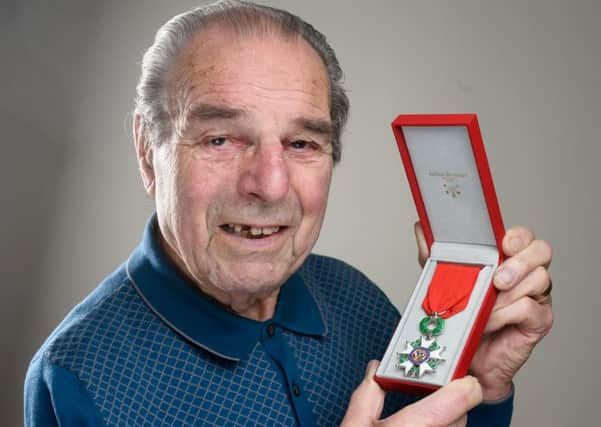Medal of honour given to Whitnash man for service after D-Day


But Whitnash pensioner Leslie Johnson, who served in the Royal Engineers during the Second World War, remembers both cities and their surrounding towns and countryside in states of devastation.
And it was for the role he played in supporting the allied liberation of Europe in the early 1940s that Mr Johnson, 93, has now received a Ordre national de la Legion d’honneur (Legion of Honour) medal from the French Government to mark him being appointed to the rank of Chevalier (knight) in the order.
Advertisement
Hide AdAdvertisement
Hide AdA letter to Mr Johnson from the French Embassy in London says: “As we contemplate a Europe of peace we must never forget heroes like you, who came from Britain and the Commonwealth to begin the liberation of Europe by liberating France.
“We owe our freedom and security to your dedication because you were ready to risk your life.”
Mr Johnson, of Moorhill Road and who has lived in Whitnash for most of his life, received a form from the Veteran’s Association which encouraged him to apply for the medal.
He said he had given up hope on receiving it and that when it arrived in the post, with the letter, it was a nice surprise.
Advertisement
Hide AdAdvertisement
Hide AdThe father-of-three said: “It’s an honour. The thing is that there aren’t all that many of us left and I don’t know how long the awarding of these medals will go on for us.”
Mr Johnson followed the allied forces into France a few weeks after the D-Day landings in the summer of 1944.
But he was almost one of the soldiers who had to be part of the initial landings on the then heavily defended beaches in Normandy.
He said: “A friend who was in my unit saw that I was down to be part of the D-Day landings and he actually asked me to swap with him.
Advertisement
Hide AdAdvertisement
Hide Ad“He knew he would be able to spend some time with his wife and children in Southampton before the operation started.
“It wasn’t normally allowed at the time but our commanding officer arranged it.
“When I landed in Normandy he was there waiting on the beach and he thanked me for swapping with him because he had been able to spend three weeks at home with his family.”
The Royal Engineers’ job during the operation was to support the allied assault by using heavy machinery to install floating harbours, repairing and building bridges and carrying out other works to ensure supplies and vehicles could get to the front line.
Advertisement
Hide AdAdvertisement
Hide AdMr Johnson served in Aramanche, Caen, Lisieux and Brussels as the engineers made their way through Europe.
And he was able to spend some time on leave in Paris after it has been liberated by the Americans.
But although he was not in the thick of the fighting, Mr Johnson and his comrades faced dangers, including land mines and bombing raids, on a regular basis.
He said: “These places had been destroyed. Some of them were just rubble and I remember the smells of gas and other things that the destruction had caused.”